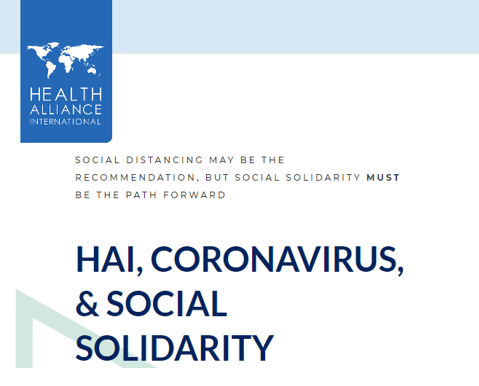Health Alliance International (HAI), a center of the University of Washington Department of Global Health, has launched their spin on a COVID information hub. The hub is providing updates on the pandemic in Mozambique, Timor-Leste, and Côte d’Ivoire, while also highlighting the adaptation and resilience of health workers and resource-limited health systems.
“When the coronavirus pandemic hit, we knew that if we were going to join the discussion, we wanted to make sure our contribution was additive,” said Adam Granato, Senior External Relations Manager at HAI.
The first section of the information hub, ‘Coronavirus is Global’, contains daily updates to confirmed case counts and reported deaths in the three countries where HAI has established programs. Demographic data and key health system indicators—such as health workers per 100,000 people, and the number of ventilators and ICU beds in each country— along with information on national coronavirus response measures provide additional context, often absent from strictly epidemiologic dashboards.
“The truth is that every country in the world right now is doing something to stop the spread and limit the harm of coronavirus,” Granato said. “Their barriers and facilitators to success in that goal are critically important to learn from; not only as we face the global threat together, but long into the future when we look at how different health systems fared when faced with this moment.”
The second section, ‘Coronavirus is Personal’, is set up with the goal of sharing the perspective and experience of those living and working to provide health care in those same countries during the pandemic. “Importantly, we want to draw attention not only to the pandemic itself, but to the cascading effects on health care delivery in general,” Granato said.
One such example comes from an interview with Dr. Yacouba Doumbia, a Senior Technical Advisor in HAI’s Côte d’Ivoire office. In the interview, Dr. Doumbia expounds on the fear, travel restrictions, and social distancing happening in the northern regions of Côte d’Ivoire and how that has affected Ivoirians living with HIV.
“The epidemic has created widespread panic [psychose] both in the general population, as well as among health providers, because it is a new infection with a lot of conflicting information,” Doumbia shared. “Consequently, health providers are reticent to approach patients normally, without protective precautions in place.”
Doumbia goes on to illustrate how a network including the Ministry of Health and local and international organizations are making adjustments to overcome misinformation and maintain continuity of care for this at-risk population.
Information, planning, and adjustment have been the common themes of HAI’s COVID work so far. In Mozambique and Timor-Leste, HAI is an active member of Ministry of Health-led, multi-sector response teams that are identifying key areas for resource and planning investments. They have put resources toward improving access to accurate information, including targeted information for key populations that HAI works with, such as people living with HIV and pregnant and breastfeeding women. The full list of HAI’s active coronavirus response activities can also be found on HAI’s COVID information hub.
As a nonprofit organization, HAI’s community, including UW students, faculty, and staff, can engage in their advocacy and create real-world, tangible impact with their contributions.
“Our longstanding presence on the ground in Mozambique, Timor-Leste, and Côte d’Ivoire, and deep ties to those Ministries of Health (MOH) mean that we can be quite responsive to MOH priorities with the availability of flexible funding,” Granato said. Those who visit the COVID information hub will also see opportunities to donate, join the HAI family, and receive digital updates on their upcoming work.
Check out HAI’s newly revamped website here.
